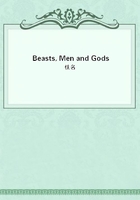
第41章 THE MYSTERIOUS LAMA AVENGER(3)
On the way back Tzeren related to us the hundreds of legends surrounding Tushegoun Lama. One tale especially remained in my mind. It was in 1911 or 1912 when the Mongols by armed force tried to attain their liberty in a struggle with the Chinese. The general Chinese headquarters in Western Mongolia was Kobdo, where they had about ten thousand soldiers under the command of their best officers. The command to capture Kobdo was sent to Hun Baldon, a simple shepherd who had distinguished himself in fights with the Chinese and received from the Living Buddha the title of Prince of Hun. Ferocious, absolutely without fear and possessing gigantic strength, Baldon had several times led to the attack his poorly armed Mongols but each time had been forced to retreat after losing many of his men under the machine-gun fire. Unexpectedly Tushegoun Lama arrived. He collected all the soldiers and then said to them:
"You must not fear death and must not retreat. You are fighting and dying for Mongolia, for which the gods have appointed a great destiny. See what the fate of Mongolia will be!"He made a great sweeping gesture with his hand and all the soldiers saw the country round about set with rich yurtas and pastures covered with great herds of horses and cattle. On the plains appeared numerous horsemen on richly saddled steeds. The women were gowned in the finest of silk with massive silver rings in their ears and precious ornaments in their elaborate head dresses.
Chinese merchants led an endless caravan of merchandise up to distinguished looking Mongol Saits, surrounded by the gaily dressed tzirik or soldiers and proudly negotiating with the merchants for their wares.
Shortly the vision disappeared and Tushegoun began to speak.
"Do not fear death! It is a release from our labor on earth and the path to the state of constant blessings. Look to the East! Do you see your brothers and friends who have fallen in battle?""We see, we see!" the Mongol warriors exclaimed in astonishment, as they all looked upon a great group of dwellings which might have been yurtas or the arches of temples flushed with a warm and kindly light. Red and yellow silk were interwoven in bright bands that covered the walls and floor, everywhere the gilding on pillars and walls gleamed brightly; on the great red altar burned the thin sacrificial candles in gold candelabra, beside the massive silver vessels filled with milk and nuts; on soft pillows about the floor sat the Mongols who had fallen in the previous attack on Kobdo.
Before them stood low, lacquered tables laden with many dishes of steaming, succulent flesh of the lamb and the kid, with high jugs of wine and tea, with plates of borsuk, a kind of sweet, rich cakes, with aromatic zatouran covered with sheep's fat, with bricks of dried cheese, with dates, raisins and nuts. These fallen soldiers smoked golden pipes and chatted gaily.
This vision in turn also disappeared and before the gazing Mongols stood only the mysterious Kalmuck with his hand upraised.
"To battle and return not without victory! I am with you in the fight."The attack began. The Mongols fought furiously, perished by the hundreds but not before they had rushed into the heart of Kobdo.
Then was re-enacted the long forgotten picture of Tartar hordes destroying European towns. Hun Baldon ordered carried over him a triangle of lances with brilliant red streamers, a sign that he gave up the town to the soldiers for three days. Murder and pillage began. All the Chinese met their death there. The town was burned and the walls of the fortress destroyed. Afterwards Hun Baldon came to Uliassutai and also destroyed the Chinese fortress there. The ruins of it still stand with the broken embattlements and towers, the useless gates and the remnants of the burned official quarters and soldiers' barracks.